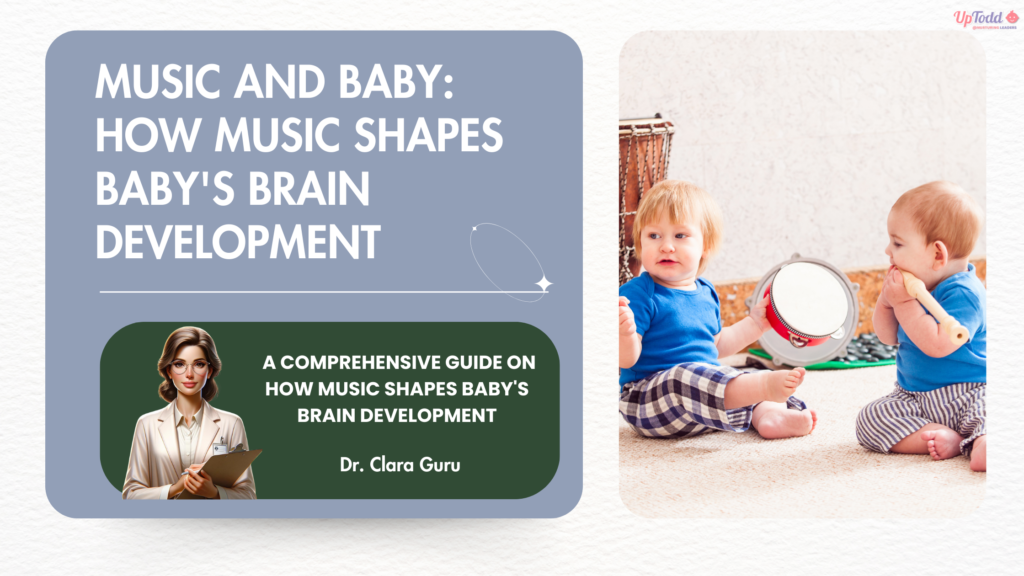
Music has an incredible power to produce a variety of emotions and alter moods. But do you know how music impacts your baby? It’s more than just a sweet melody. From Calming lullabies to playful, fun songs during playtime, music plays an important role in shaping our little ones’ developing brains. In this blog, Dr. Clara Guru, our child development expert, will inform us about the impact of music on various regions of a baby’s brain and its important role in their overall development.
impact of music on brain areas
According to neuroscientists, music has amazing benefits for your baby. Music has a significant impact on the developing newborn brain. According to a study conducted by the Institute of Learning and Brain Sciences, newborns’ auditory and prefrontal cortices change after listening to music. These are the areas of the brain responsible for processing both music and speech. Many brain areas tend to be stimulated when music is played. Let us explore how music impacts different parts of a baby’s brain and shapes their development.
-
Auditory Cortex
The auditory cortex is situated in the temporal lobes. It plays a major role in processing sound. When babies hear music, their temporal lobe and auditory cortex start recognising rhythms, melodies, and even emotions conveyed through music. This lays the foundation for auditory comprehension and language development.
-
Limbic System
limbic system is located deep within the brain and includes brain components such as amygdala and hippocampus. These are responsible for producing, processing, and controlling emotions and memory. Music has a direct relationship with the brain area, as it produces a variety of emotions and neural responses. When music is played, baby’s limbic system gets filled with variety of feel-good neurotransmitters, promoting a sense of comfort and security. These emotions form the building blocks of attachment and social bonding, shaping babies’ emotional intelligence and interpersonal skills.
-
Prefrontal Cortex
The prefrontal cortex controls higher-order cognitive functions such as attention, planning, decision making, problem-solving, spatial reasoning, and self-regulation. Music plays a great role in developing and enhancing these cognitive functions in babies. Through musical play and engagement, babies learn to focus their attention, exercise their memory, and understand social cues.
-
Motor Cortex
The motor cortex is responsible for coordinating movement, and music is like a personal trainer for it. When babies sway, clap, or tap to music, their motor cortex is getting a workout, helping them develop coordination and rhythm.
Research says that music results in enhanced neural responses in both auditory and prefrontal cortices. it helps create and strengthen connections of neurons, which in turn enables communication among neurons that specialise in different kinds of brain functions.
Reference from How musical training affects cognitive development: rhythm, reward and other modulating variables
impact of music on babies’ overall development
-
Language Skills
listening to music can boost language development in babies. As they listen to songs with repetitive lyrics or catchy melodies, they start picking up on patterns and sounds, helping in language acquisition.
-
Cognitive skills
It helps sharpen their memory, attention, and problem-solving skills. Plus, studies have shown that babies exposed to music early on tend to perform better in tasks that require spatial reasoning and mathematical skills later in life.
-
Social Skills
Whether it’s singing along with carers or participating in musical playdates, engaging with music helps babies develop social bonds and communication skills.
-
Emotional Regulation
Babies may not have words to express how they feel, but music gives them a voice. Whether it’s a soothing lullaby or an upbeat tune, music has the power to calm fussy babies, alleviate stress, and create a sense of security and comfort.
-
Enhances Mood
Music is a great way to soothe and calm your little one. It releases feel-good hormones such as serotonin, dopamine, and oxytocin. These make the baby feel happy, safe, and relaxed. It enhances baby’s mood and reduces anxiety.
-
Promotes Bonding
Dancing, playing, and singing music together supports moving together with the rhythm, which in turn promotes bonding.
Final thoughts by Dr. Clara GUru
Music is more than just entertainment for babies—it’s a fundamental tool for their development. By engaging various parts of their brain, music helps babies learn language, regulate emotions, improve motor skills, and cultivate creativity. Our developmental expert, Dr. Clara Guru, advises that it is important to continue to sing, dance, and make music with our little ones. Through the gift of music, we can create lasting memories, strengthen our bonds, and lay the foundation for a lifetime of love, learning, and harmony.
Explore UpTodd to unleash hidden abilities of the baby
faq
- How will music impact my baby’s brain?
- Are there any other developmental benefits of music for my baby?
